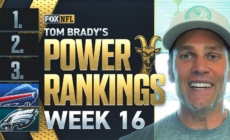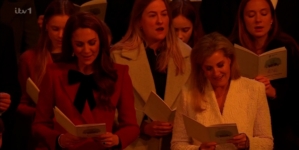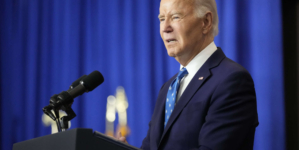-
Tom Brady’s Power Rankings: Who made the GOAT’s Top 5 teams entering Week 17? - 15 mins ago
-
Baby Sleep Consultant’s Important PSA for Parents ‘In The Trenches’ - 37 mins ago
-
12/24: CBS Evening News – CBS News - 45 mins ago
-
76ers beat Spurs, Joel Embiid ejected during 2nd quarter | First Things First - 58 mins ago
-
‘Connections’ Christmas Day 2024: Hints and Answers for Puzzle #563 - about 1 hour ago
-
Caitlin Clark honored as AP Female Athlete of the Year for impact on women’s sports - 2 hours ago
-
Why It Took 248 Years for the Bald Eagle to Become America’s National Bird - 2 hours ago
-
Lamar Jackson is determined to see Beyoncé’s Christmas show at halftime of Ravens-Texans - 2 hours ago
-
Together at Christmas’ at Westminster Abbey - 2 hours ago
-
Biden Signs Bill Outlawing Pensions for Lawmakers Convicted of Some Crimes - 3 hours ago
It’s Time to Stop Calling Donald Trump a Fascist | Opinion
Say what you will about MAGA, its diversity is impressive.
Election deniers, smarmy billionaires, hot-for-Armageddon Christian nationalists, waterborne Nazis, a shrinking handful of sadly deluded conservatives, Laura Loomer, Kid Rock, Roseanne Barr, Rudy Giuliani—far from a monolith, MAGA is a rainbow coalition of insurrectionists, cranks, and pin-striped goons.
Recently, however, more and more observers have taken to painting the movement and especially its sundowning 78-year-old leader with a single, saucy epithet: Fascist.
ANGELA WEISS/AFP via Getty Images
It’s no secret that some of the defining characteristics of fascism are on full display in former President Donald Trump’s spasmodic rhetoric and in the dark circus that is MAGA. For instance, the fixation on violence; a desire to resurrect a homogenous and wholly mythical Golden Age: a schizoid certainty that the movement’s enemies—shadowy elites (translation: Jews), leftists, puppy-scarfing immigrants—are, as Umberto Eco phrased it in a 1995 essay, Ur-Fascism, “at the same time too strong and too weak.”
So, when figures as varied in outlook, occupation, and political bent as former chairman of the Joint Chiefs of Staff Gen. Mark Milley, Charlamagne Tha God, and Yale historian Timothy Snyder characterize Trump and Trumpism as “fascist,” attention must be paid.
But here’s the thing. Like so many other international phenomena that assumed new forms once they arrived on these shores—photography (born in France), LSD (Switzerland), Italian food (you know that our Fettuccine Alfredo is not really a thing over there, right?)—fascism in the U.S. is a different beast than the original. And no wonder. In a culture far more pluralistic than those in which the first iteration took hold, America’s own fascism virus has mutated again and again since it first emerged in the German American Bund of the late 1930s.
To one degree or another, George Lincoln Rockwell’s American Nazi Party, the White Aryan Resistance, the Proud Boys, the Patriot Front, and a host of other U.S.-based groups have ascribed to several or all of the core fascist precepts, e.g., ultranationalism, race superiority, a worship of hyper-masculinity, a love of stupid costumes. For all their similarities, though, these same groups not only disagree on fundamental questions—are Blacks, Latinos, and Asians allowed in the movement? To what extent is political violence not only permitted, but ordained?—they are sometimes in direct, heated competition for members, funds, and media attention.
Which brings us back to MAGA and Trump. That there is spillover from these extremist groups into Trump’s orbit is clear—see Waterborne Nazis, above—just as it’s obvious that the former president and his most fervent followers wallow in fascist bombast. Umberto Eco noted in the forementioned 1995 essay that “the first appeal of a fascist or prematurely fascist movement is an appeal against the intruders,” and what’s more MAGA than that?
What’s less clear is whether Trumpism, for all its sleaze, bigotry, and cynicism, is an authentically fascist venture. Is Trump, in the final analysis, a fascist?
With respect to Gen. Milley, Professor Snyder, and the rest, one could make the argument—oh, what the hell, let’s just make it—that not only is Trump not a fascist. He’s worse.
Consider this: As loathsome as the fascism shaped and practiced in 1930s and 1940s Europe, Greece’s Golden Dawn in the 1980s, President Vladimir Putin’s Russia, etc., certainly is, it is nonetheless a functional, considered ideology, with a generally sound internal logic of its own. One can despise fascism while respecting its rigor and its tribalistic appeal.
It is not possible, on the other hand—or it shouldn’t be, anyway—for any sane human over the age of, say, 7 or 8 to respect a pathologically dishonest, intellectually bereft, morally bankrupt sexual abuser and autocrat-fanboy like Trump.
If Trump fits within any political tradition, it’s a sort of blunt, low-cunning authoritarianism. MAGA, after all, is an authoritarian movement, just as today’s GOP is a patently authoritarian party. But any two-bit goon can be an authoritarian; it takes at least nominal adherence to an ideology to be a legit, committed fascist.
Fascist true believers might have his ear. He might bellow fascist talking points at his rallies. He might admire fascists, living and dead. But far from an ideological warrior, Trump’s animating principle appears to be a bone-deep, reflexive gangsterism wedded to frenzied self-preservation.
How can I stay out of prison? How can I pry more money out of my pathetic cult? How can I destroy those who question my authority, make me look weak, laugh in my face?
Fascism is a scourge, but it’s a known scourge, with recognizable antecedents.
Trumpism is a new, still-evolving, ultra-right pathology, fueled largely by greed and grievance and positively brimming with malice.
Which prospect should we fear more?
Benedict Cosgrove is a librarian, former editor at LIFE.com, and freelance writer who has contributed to The New York Times, Washington Post, Smithsonian, and other outlets. He lives in New York City.
The views expressed in this article are the writer’s own.
Source link































